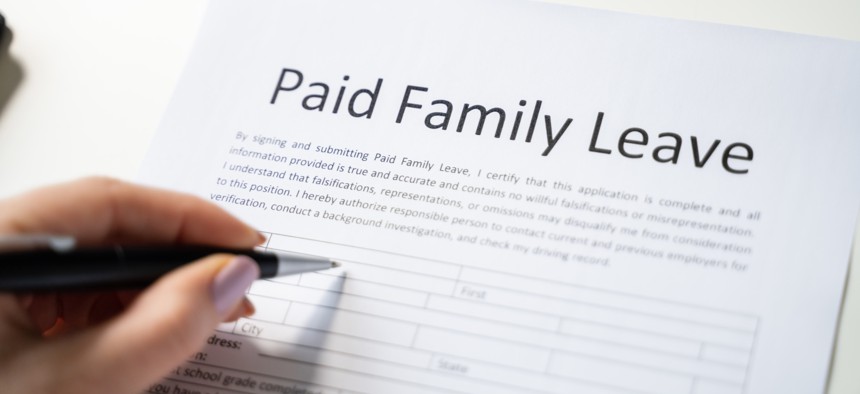
OPM officials offered agencies new details on how to apply FMLA benefits to federal employees with active duty military service. AndreyPopov / Getty Images
OPM makes it easier for ex-military feds to access paid parental, medical leave
The tweak, which allows federal workers to count past military service toward the 12-month service requirement of parental and Family and Medical Leave Act leave, stems from a provision of the 2024 National Defense Authorization Act.
The Office of Personnel Management on Tuesday outlined how agencies should apply a recent tweak to eligibility requirements for paid parental and Family and Medical Leave Act leave aimed at making it easier for ex-military federal workers to access the benefits.
When Congress first enacted federal employees’ 12 weeks of paid parental leave per year, eligibility for the benefit mirrored that of FMLA leave, namely that feds would become eligible to use the benefit once they have at least 12 months of federal service. But “federal service” referred only to time spent employed as a civilian federal employee, and not active duty military service.
Last December, lawmakers included a new provision in the 2024 National Defense Authorization Act clarifying that “honorable” active duty military service will count toward the FMLA’s eligibility requirements, and in turn to the federal workforce’s paid parental leave benefit.
In a memo to agency heads Tuesday, OPM Director Kiran Ahuja outlined how federal agencies should implement the tweak. Specifically, federal employees whose military service would put them over a year of federal service should “immediately” become eligible for the two forms of leave, dating back to Dec. 22, 2023, the day President Biden signed the NDAA into law.
“Agencies should send out notifications to their employees that any employee with prior military service who previously had not yet met the 12-month service requirement for FMLA leave eligibility purposes should contact their human resources or other identified agency office to determine whether they now meet the service requirement and are eligible for FMLA leave,” she wrote. “This is especially important for employees who have recently had or will soon have a child born or placed with them for adoption or foster care since under FMLA an employee’s entitlement to FMLA leave with substitution of paid parental leave may only be used during the 12-month period beginning on the date of the birth or placement of the employee’s child.”
Federal workers may use any combination of civilian and military service to meet the leave programs’ eligibility requirement, though the change is not retroactive. While feds may immediately become eligible for the paid leave benefits upon the law’s enactment, they may not be credited or receive leave that they wished to take prior to December 2023.
Ahuja also offered a number of examples explaining how the change may work in practice. A veteran with more than a year of military service would become immediately eligible for both paid parental and FMLA leave upon their hiring at a federal agency.
And a military veteran with only six months of civilian federal service when their child was born in September 2023 would immediately become eligible for paid parental leave beginning Dec. 22, though their access to 12 weeks of leave would end in September 2024, due to the one-year deadline to use parental leave from when the child is born or adopted.







